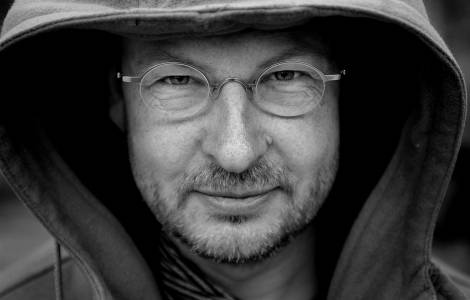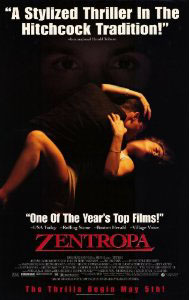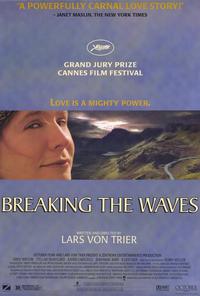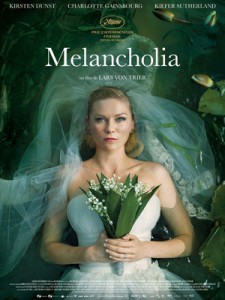Tales Of A Controversial Provocateur
Written by: FFT Webmaster | November 11th, 2011
 More than any other figure in contemporary cinema, Danish director Lars von Trier is a controversial provocateur, both admired for his daring artistic vision and condemned for his inappropriate comments. The latter came to a head in the past several months after von Trier made a point at his news conference at the Cannes Film Festival to speak kindly of Hitler and other Nazi figures, while saying that he himself “could be a Nazi”. The comments got him banned from the Festival as persona non grata, and the reverberations of that event have led to investigations in his native Denmark, and an avowed statement by the director that he will never speak to the press again. As despicable as his utterings have been, there is no denying that he is a singular film artist, and his latest film MELANCHOLIA, which opens in the United States today, is being hailed as his masterpiece. How do we deal with a man of such obvious gifts but who has the unfortunate habit of speaking before he thinks things through. And how much of his incendiary remarks are done for effect, as opposed to a deep ideological fanaticism? I suspect a whole lot….his dry and dark Scandinavian wit has tripped him up more than once but it is also the inspiration for his artistic vision and command of the language of cinema.
More than any other figure in contemporary cinema, Danish director Lars von Trier is a controversial provocateur, both admired for his daring artistic vision and condemned for his inappropriate comments. The latter came to a head in the past several months after von Trier made a point at his news conference at the Cannes Film Festival to speak kindly of Hitler and other Nazi figures, while saying that he himself “could be a Nazi”. The comments got him banned from the Festival as persona non grata, and the reverberations of that event have led to investigations in his native Denmark, and an avowed statement by the director that he will never speak to the press again. As despicable as his utterings have been, there is no denying that he is a singular film artist, and his latest film MELANCHOLIA, which opens in the United States today, is being hailed as his masterpiece. How do we deal with a man of such obvious gifts but who has the unfortunate habit of speaking before he thinks things through. And how much of his incendiary remarks are done for effect, as opposed to a deep ideological fanaticism? I suspect a whole lot….his dry and dark Scandinavian wit has tripped him up more than once but it is also the inspiration for his artistic vision and command of the language of cinema.
His confusion about his origins has a basis in fact. He was born Lars Trier in a suburb of Copenhagen in April 1956. He had believed that his biological father was Ulf Trier (1907-1978), a non-religious Jew, until his mother revealed to him on her deathbed that he had been conceived as a result of an affair she had with her employer, Fritz Michael Hartmann, a German national briefly living in Denmark. He did not discover the identity of his biological father until 1989, which left him unsure about his particular DNA (and thus triggering a reflective examination of how “German” he truly was and is). His parents did not allow much room in their household for “feelings, religion, or enjoyment”, the director recalled in a later interview, with complex results for von Trier’s personality and development. The young man found in cinema an outlet to the outside world through which he could learn about subjects otherwise forbidden from his study by his parents. He began making his own films at the age of 11 after receiving a Super-8 camera as a gift and continued to be involved in independent moviemaking throughout his high school years.
 In 1979, he was enrolled in the National Film School of Denmark. His peers at the film school nicknamed him “von Trier”. The name is sort of an inside-joke with the von (German “of” used to convey nobility). He reportedly kept the “von” name in homage to iconic directors Erich von Stroheim and Josef von Sternberg, both of whom also added it later in life. During his time as a student at the school he made the films NOCTURNE (1980) and THE LAST DETAIL (1981), both of which won Best Film awards at the Munich International Festival of Film Schools. After graduation he began work on the very stylized crime drama, THE ELEMENT OF CRIME (1984), which won a technical award at the Cannes Film Festival. His next film was EPIDEMIC (1987), a dark science fiction tale of a future epidemic plague, which was shown at Cannes in the Un Certain Regard section. The third film in his so-called “European trilogy” was EUROPA (released as ZENTROPA in the United States, which won the Jury Prize at the 1991 Cannes Film Festival as well as other awards at major international film festivals.
In 1979, he was enrolled in the National Film School of Denmark. His peers at the film school nicknamed him “von Trier”. The name is sort of an inside-joke with the von (German “of” used to convey nobility). He reportedly kept the “von” name in homage to iconic directors Erich von Stroheim and Josef von Sternberg, both of whom also added it later in life. During his time as a student at the school he made the films NOCTURNE (1980) and THE LAST DETAIL (1981), both of which won Best Film awards at the Munich International Festival of Film Schools. After graduation he began work on the very stylized crime drama, THE ELEMENT OF CRIME (1984), which won a technical award at the Cannes Film Festival. His next film was EPIDEMIC (1987), a dark science fiction tale of a future epidemic plague, which was shown at Cannes in the Un Certain Regard section. The third film in his so-called “European trilogy” was EUROPA (released as ZENTROPA in the United States, which won the Jury Prize at the 1991 Cannes Film Festival as well as other awards at major international film festivals.
 In 1992, he and producer Peter Aalbæk Jensen founded the movie production company Zentropa Entertainment to achieve financial independence and to have total creative control. The production company has produced many movies other than von Trier’s own as well as television series. It is also the world’s only mainstream film studio to have produced hardcore sex films. The first film from the new creative shingle was the surrealistic hospital-based television mini-series THE KINGDOM (1994), which was a worldwide hit, along with its sequel THE KINGDOM II (1997). One of the key elements to emerge from Zentropa was a new cinematic manifesto that von Trier and fellow director Thomas Vinterberg dubbed Dogme 95. The aesthetic was anti-Hollywood to the core, encouraging filmmakers to be as realistic as possible and work with limited budgets in order to inspire more risk-taking. The first film to emerge from this new aesthetic was BREAKING THE WAVES (1996), a powerful drama starring Emily Watson as a fragile young woman. The film was an international sensation, winning the Grand Prix at the Cannes Film Festival and even garnering an Oscar nomination for the film’s star. He followed up this great success with two more films in his “golden heart trilogy”, specifically THE IDIOTS (1998) and DANCER IN THE DARK (2000), the latter starring musical star Bjork and screen icon Catherine Deneuve.
In 1992, he and producer Peter Aalbæk Jensen founded the movie production company Zentropa Entertainment to achieve financial independence and to have total creative control. The production company has produced many movies other than von Trier’s own as well as television series. It is also the world’s only mainstream film studio to have produced hardcore sex films. The first film from the new creative shingle was the surrealistic hospital-based television mini-series THE KINGDOM (1994), which was a worldwide hit, along with its sequel THE KINGDOM II (1997). One of the key elements to emerge from Zentropa was a new cinematic manifesto that von Trier and fellow director Thomas Vinterberg dubbed Dogme 95. The aesthetic was anti-Hollywood to the core, encouraging filmmakers to be as realistic as possible and work with limited budgets in order to inspire more risk-taking. The first film to emerge from this new aesthetic was BREAKING THE WAVES (1996), a powerful drama starring Emily Watson as a fragile young woman. The film was an international sensation, winning the Grand Prix at the Cannes Film Festival and even garnering an Oscar nomination for the film’s star. He followed up this great success with two more films in his “golden heart trilogy”, specifically THE IDIOTS (1998) and DANCER IN THE DARK (2000), the latter starring musical star Bjork and screen icon Catherine Deneuve.
Von Trier relished his reputation as a “cinema bad boy” who freely mixed political commentary with sexually explicit imagery. At his press conferences at major festivals, he was quite provocative, denouncing his country’s royal family and the cinema establishment in general. He also was extremely critical of the United States, particularly its political policies following 9/11. In his “U.S. trilogy” films, he used major international movie stars, including Nicole Kidman, Lauren Bacall, James Caan, Danny Glover and others, but both DOGVILLE (2003) and MANDERLAY (2005) were highly experimental and eccentric and did not expand von Trier’s audience beyond its hardcore devotees. The third film in the trilogy, which criticized gun worship and violence in American society, was DEAR WENDY (2005), actually directed by von Trier’s “Dogme-brother” Thomas Vinterberg from a script by von Trier. His follow up film, the horror noir ANTICHRIST, about a grieving couple who retreat to a cabin in the woods where things go from bad to worse, was his most sexually explicit and horrific, polarizing both critics and audiences (although it did win a Best Actress prize at the Cannes Film Festival for its lead Charlotte Gainsbourg).
His newest film MELANCHOLIA premiered at this year’s Cannes Film Festival, the site of his notorious press conference, to stunning reviews. The film won a Best Actress prize for its lead Kirsten Dunst, in a performance that has been hailed as one of the best of the year. The film combines apocalyptic science fiction with an incisive portrait of depression, a state that both von Trier and his lead actress have acknowledged a personal connection to. The film is being released today via Magnolia Pictures and looks to be one of the arthouse hits of the season. While von Trier has recently announced that he no longer will attend film festivals and will not conduct any press interviews, he has announced that his next film will be THE NYMPHOMANIAC, about the sexual awakening of a young woman.
 Von Trier is a creature of his own multiple phobias, including an intense fear of flying. His fear of air travel frequently places severely limiting constraints on him and his crew, necessitating that virtually all of his films be shot in either Denmark or Sweden, even those set in the United States or other foreign countries. Von Trier has had a number of his films featured at the Cannes Film Festival over the course of his career, and each time has insisted on driving from Denmark to France for the festival and back. On numerous occasions, he has also stated that he suffers from deep depression, which renders him incapable of performing his work and unable to fulfill social obligations. This condition, plus the unnerving discovery that the past he perceived as truth was a lie, may render his outrageous and insensitive outbursts understandable, even if they remain offensive to many. For the depths that he explores in MELANCHOLIA of a condition that blinds its sufferer to reason, beauty and the potential of human understanding, one cannot help but forgive Mr. von Trier and hope that he has learned a lesson in forgiveness. In the meantime, his artistry has never been more profound than in the film that now inhabits this country’s most adventurous film theaters.
Von Trier is a creature of his own multiple phobias, including an intense fear of flying. His fear of air travel frequently places severely limiting constraints on him and his crew, necessitating that virtually all of his films be shot in either Denmark or Sweden, even those set in the United States or other foreign countries. Von Trier has had a number of his films featured at the Cannes Film Festival over the course of his career, and each time has insisted on driving from Denmark to France for the festival and back. On numerous occasions, he has also stated that he suffers from deep depression, which renders him incapable of performing his work and unable to fulfill social obligations. This condition, plus the unnerving discovery that the past he perceived as truth was a lie, may render his outrageous and insensitive outbursts understandable, even if they remain offensive to many. For the depths that he explores in MELANCHOLIA of a condition that blinds its sufferer to reason, beauty and the potential of human understanding, one cannot help but forgive Mr. von Trier and hope that he has learned a lesson in forgiveness. In the meantime, his artistry has never been more profound than in the film that now inhabits this country’s most adventurous film theaters.


